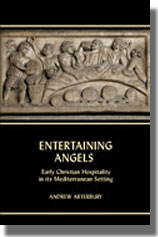
$90.00
Hospitality in the ancient Mediterranean world was not a matter of entertaining one’s neighbors to dinner. Neither was it the same as table-fellowship among the early Christians, although most modern works confuse that with hospitality. Hospitality was essentially the provision of food and protection for travelers; it could include also a bath, supplies for the traveler’s onward journey, and an escort along the road to to the traveler’s next destination.
Unlike other writers, Arterbury combs through a broad spectrum of Greek, Roman, and Jewish texts—as well as early Christian texts outside the New Testament—for literary depictions of the custom of hospitality. As well, he brings into the picture the Greek novels, which provide us with vivid insights into ancient Mediterranean life. His book presents the most complete analysis of the terms used for hospitality, and he shows how important the practice of hospitality is in understanding the narrative of the conversion of the Gentile Cornelius in Acts 10–11: Luke is here suggesting that Christian communities should employ the traditional custom of hospitality as an effective means of bridging the cultural divide between Jews and Gentiles, evangelizing unbelievers, and forging bonds of friendship with strangers.
This revealing and engaging example of what Arterbury describes as “historical audience-oriented criticism” will be appreciated by scholars and students interested in the reality of life in New Testament times.
1. Introduction
2. Greco-Roman Hospitality in Antiquity
3. Jewish Hospitality in Antiquity
4. Early Christian Hospitality
5. The Custom of Hospitality in Luke’s Writings with a Focus on Acts 10–11
6. Conclusion
Bibliography
Index of References
Index of Authors
Andrew Arterbury is Assistant Professor of Religion, Baylor University, Waco, Texas.
The SBL is the North American distributor for Sheffield Phoenix Press. Customers outside of North America can purchase this book directly from Sheffield Phoenix by clicking
